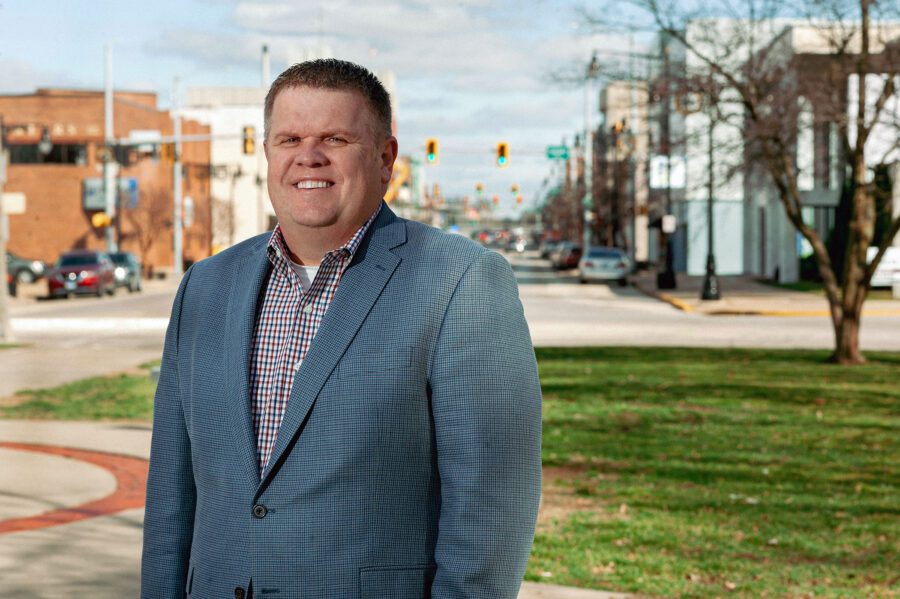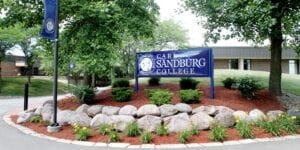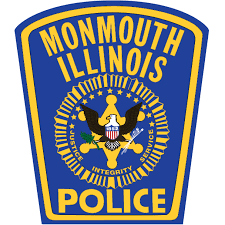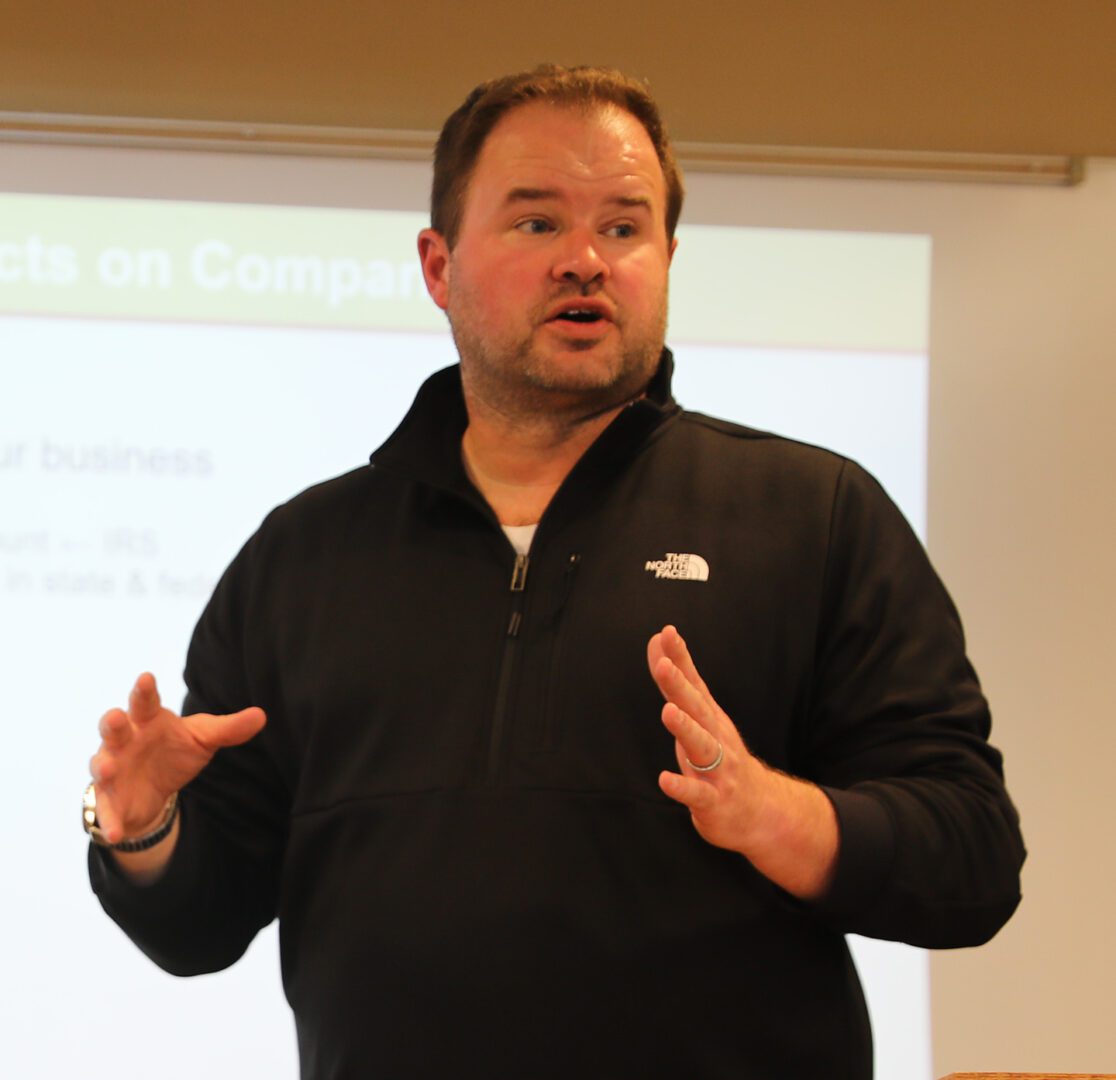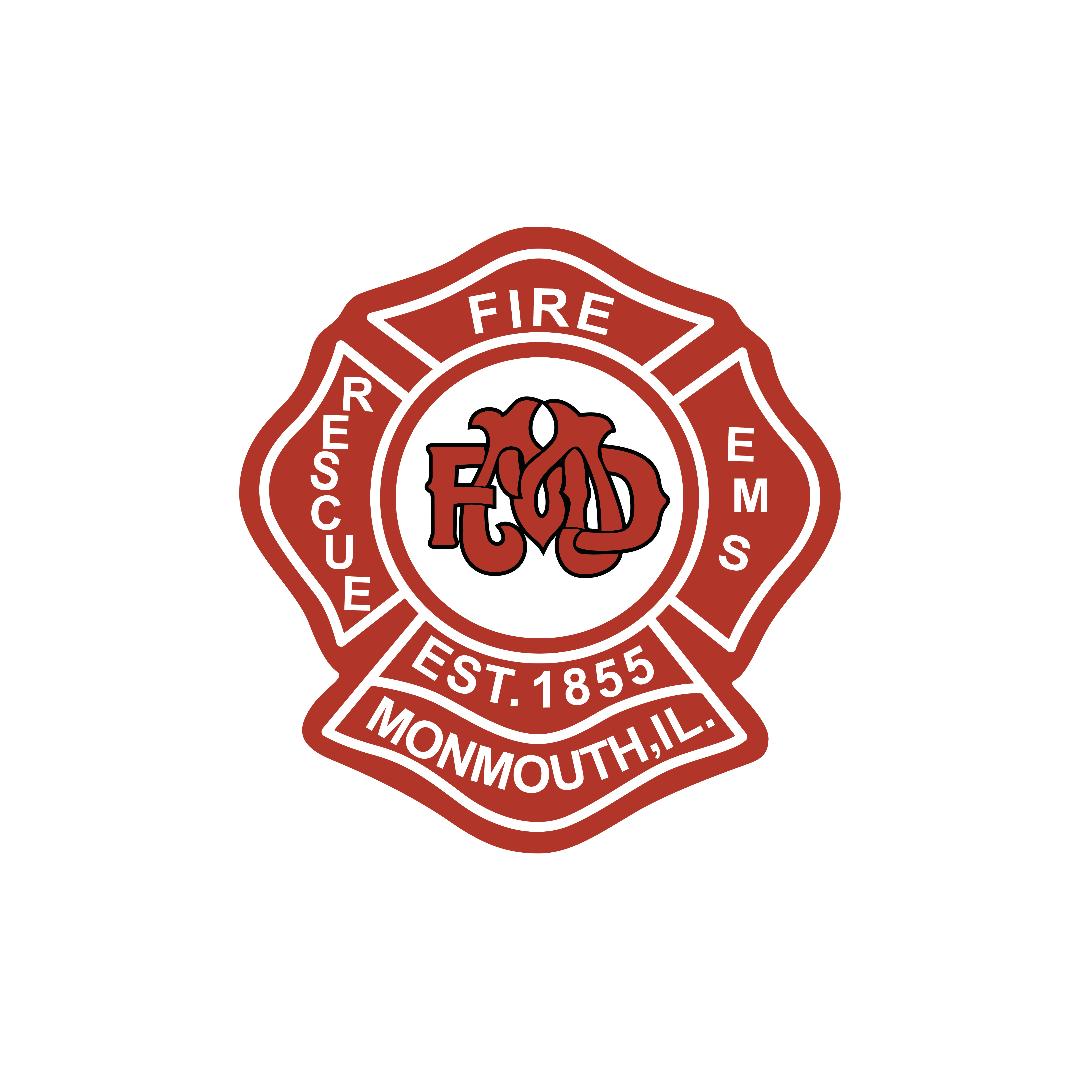When Eric Hanson ’98 drives back to his former community of Normal, Illinois, he passes by the state-of-the-art facility for electric vehicle manufacturer Rivian.
He remembers his time as Normal’s assistant city manager, when he and his team helped save a dilapidated warehouse that had sat unused for 15 years and was targeted for demolition. It’s now a 1 million square-foot facility for Rivian.
“I drive by it, and I see rows of trucks in the parking lot and hundreds of people working,” he said. “It’s pretty rewarding to see that type of progress.”
If Hanson needs some gas while he’s in Normal, he can drive out to where Interstates 74, 55 and 39 intersect northwest of the city and fill up at Love’s. That takes him back to a three-year project of bringing the Oklahoma City-based travel stop to town.
“It’s the largest Love’s property in their network,” said Hanson. “We started that project in the fall of 2019, and then we had COVID. We worked hard to keep it going and get it to the finish line in 2022.”
The Love’s jobs are nice for the community, but perhaps more important is the revenue created.
“It brings in between $1 million and $2 million, free and clear, for Normal,” said Hanson. “That’s money that can be used for parks and trails, for public safety, for infrastructure. That might not be the most sexy project I’ve been a part of, but it’s one that really moved the needle.”
A new challenge
The residents of Galesburg, Illinois, are hoping that Hanson can work that type of magic in their town, where the Monmouth College graduate was appointed city manager late last year. Hanson acknowledged there are challenges in his new role, but he preached a forward-thinking approach.
“We’re trying to change the trajectory,” he said. “Like so many towns in the Midwest that have lost manufacturing jobs, that’s a big chunk of the economy. The biggest hurdle ahead is, are we going to continue to look in the rearview mirror of what we had 20 years ago, or are we going to work toward what we want to be 20 years from now? That’s no small task, but it’s a task worth attacking.”
The rearview mirror shows the loss of Maytag, the city’s largest employer, two decades ago – a development that has been studied by Monmouth College political science students. But Hanson said there is a healthy list of pros to help offset that con.
“Galesburg is located on an interstate system and is a major railroad hub,” he said. “BNSF (Railway) is a huge player regionally. Knox College is here, and the new Knox president (Andrew McGadney) is outstanding. He sees a bigger, regional picture.”
As a Monmouth student, Hanson served on the presidential search committee that ultimately chose Richard Giese, who served in that role from 1997-2005 and oversaw a period of major growth for the College.
“He led a concerted effort to have the College and the city work together, and the results speak for themselves,” said Hanson. “I see similar potential here with Knox.”
Hanson also pointed to Carl Sandburg College, a strong school district, OSF HealthCare and “an incredible downtown” as major community assets.
“We have a lot of things going for us that we should be proud of,” he said. “There are definitely assets here to build off of.”
It would be Hanson’s hope that in 20 years, Galesburg’s infrastructure has improved considerably. To attract the large manufacturing companies and truck stops of the world, those types of changes have to come first.
“There’s been a lot of deferred maintenance,” he said, including roads, fiber broadband and housing as areas that require particular focus.
“Housing development leads to workforce development which leads to economic development,” he said. “Right now, even if we could attract an employer that brought in 2, 3, 4,000 jobs, we don’t have the housing to support it. So you look for companies that employ 50 or 100 people and have the potential to grow.”
Such growth companies, he said, could come from the areas of renewable energy or agribusiness, to name two.
Solving problems
Hanson is drawn to the work of a city manager because it provides an opportunity to help.
“I understand how government functions and how it can work to create better communities,” he said. “Philosophically, I’m not one to believe that government will solve all of our problems, but there’s an appeal to doing this type of work at the local level and helping people you know.”
Hanson has also had stops in city government in Indianola, Iowa, in Ballwin, Missouri, and in Monmouth, in addition to serving as mayor of his native Cambridge, Illinois, at the young age of 24. In all, he estimates he’s been a part of $1.25 billion in development, including at least $100 million in public infrastructure improvements.
Addressing infrastructure was the key to another of his big wins, which came while he was the city manager in Monmouth.
“Smithfield employs a lot of people in the region,” he said. “Working on a sewer plant isn’t high on my list of fun things to do, but it’s a necessity. But for solving the infrastructure problems we faced, (Smithfield) wouldn’t be there. I still feel good about that one.
“All of these things have taken great teams. I’ve had the privilege of working in places with great people.”
His Monmouth College experience
In Indianola, in addition to successes with commercial development, a medical facility and housing, Hanson served on Simpson College’s presidential search committee. The experience took him back to what he said was a formative time in his Monmouth College career.
“I was 20 years old, and just being in the room with leaders like (search committee members) Walter Huff ’56, Fred Wackerle ’61, David Bowers ’61, Peter Bunce and Saf Peacock was quite an education,” he said. “They were all in their prime and at the top of their game. That was an education that I couldn’t get in the classroom.”
Another Monmouth figure in his prime during Hanson’s time as a student was political science professor Ira Smolensky, who served as Hanson’s academic adviser, as well as a mentor. Hanson’s poli sci courses were helpful but, given his future career as a city administrator, the economics courses he took as an upperclassman were especially valuable.
“I use things I learned in Rod Lemon’s macro- and microeconomic courses every single day,” he said, while also giving a shout out to Lemon’s department colleagues, Mike Connell and Dick Johnston. “The fundamentals of a good economy and the principles of sound financial policy apply to government, as well, despite what some people might think. Those two departments – political science and economics – and those four individuals really shaped my Monmouth education.”
Hanson also enjoyed classes he took or interactions he had with faculty members such as Roger Haynes, Lee McGaan, Steve Buban, Doc Kieft and Jim Betts.
“I’m very grateful for my Monmouth College experience and for the education I received,” said Hanson, who met his wife, Tara Sloss Hanson ’00, as a Monmouth student. “It put me on a path to success, and now it’s come full circle. I’m back home. And that was part of the appeal of taking this job – getting Tara closer to home. She has as deep or deeper roots in the community than I do. When we were out to dinner in town a few weeks ago, I didn’t know anybody in the restaurant, but she knew a whole tableful of educators from her time here in District 205.”
***Courtesy of Barry McNamara, Monmouth College***


